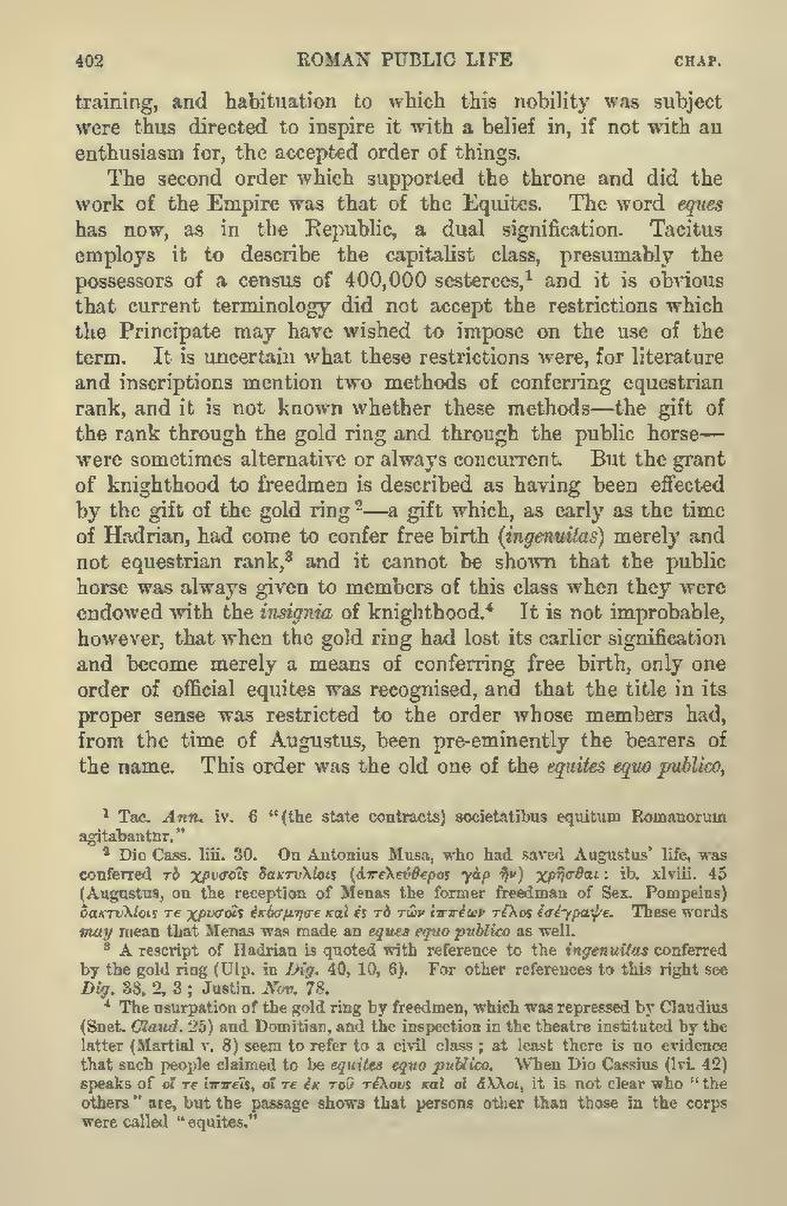training, and habituation to which this nobility was subject were thus directed to inspire it with a belief in, if not with an enthusiasm for, the accepted order of things.
The second order which supported the throne and did the work of the Empire was that of the Equites. The word eques has now, as in the Republic, a dual signification. Tacitus employs it to describe the capitalist class, presumably the possessors of a census of 400,000 sesterces,[1] and it is obvious that current terminology did not accept the restrictions which the Principate may have wished to impose on the use of the term. It is uncertain what these restrictions were, for literature and inscriptions mention two methods of conferring equestrian rank, and it is not known whether these methods—the gift of the rank through the gold ring and through the public horse—were sometimes alternative or always concurrent. But the grant of knighthood to freedmen is described as having been effected by the gift of the gold ring[2]—a gift which, as early as the time of Hadrian, had come to confer free birth (ingenuitas) merely and not equestrian rank,[3] and it cannot be shown that the public horse was always given to members of this class when they were endowed with the insignia of knighthood.[4] It is not improbable, however, that when the gold ring had lost its earlier signification and become merely a means of conferring free birth, only one order of official equites was recognised, and that the title in its proper sense was restricted to the order whose members had, from the time of Augustus, been pre-eminently the bearers of the name. This order was the old one of the equites equo publico,: ib. xlviii. 45 (Augustus, on the reception of Menas the former freedman of Sex. Pompeius) [Greek: daktylois te chrysois ekosmêse kai es to tôn hippeôn telos esegrapse]. These words may mean that Menas was made an eques equo publico as well.], it is not clear who "the others" are, but the passage shows that persons other than those in the corps were called "equites."]
- ↑ Tac. Ann. iv. 6 "(the state contracts) societatibus equitum Romanorum agitabantur."
- ↑ Dio Cass. liii. 30. On Antonius Musa, who had saved Augustus' life, was conferred [Greek: to chrysois daktyliois (apeleutheros gar ên) chrêsthai
- ↑ A rescript of Hadrian is quoted with reference to the ingenuitas conferred by the gold ring (Ulp. in Dig. 40, 10, 6). For other references to this right see Dig. 38, 2, 3; Justin. Nov. 78.
- ↑ The usurpation of the gold ring by freedmen, which was repressed by Claudius (Suet. Claud. 25) and Domitian, and the inspection in the theatre instituted by the latter (Martial v. 8) seem to refer to a civil class; at least there is no evidence that such people claimed to be equites equo publico. When Dio Cassius (lvi. 42) speaks of [Greek: hoi te hippeis, hoi te ek tou telous kai hoi alloi
